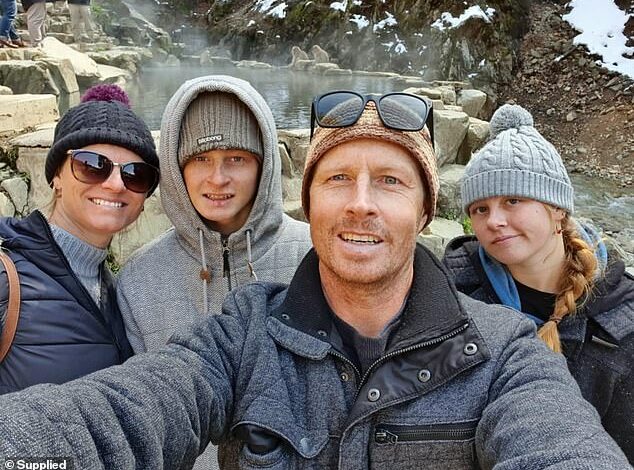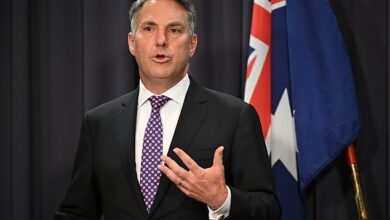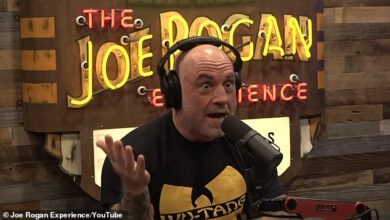I was a fit and healthy surfing fanatic and father of two before doctors discovered a tumor in my brain. This was the little warning sign that I had terminal cancer

EXCLUSIVE
An Australian father of two with terminal brain cancer plans to continue living his life to the full despite his devastating diagnosis.
Kelly Smith, 49, was a strong, healthy and super-fit dad and surfer before he started suffering from persistent headaches earlier this year.
Mr Smith, who met his wife Casey in 1995, has two children Reef and Isla and currently lives on Queensland’s Sunshine Coast.
Before his diagnosis, the 49-year-old ran a successful surf school on the Central Coast of NSW for 20 years and worked as a surf photographer.
But everything changed in August when an MRI revealed a lesion in his brain and a subsequent CT scan confirmed his family’s worst fears.
There was a tumor the size of a tangerine near Mr. Smith’s right temporal lobe. The father of two had to undergo emergency surgery the next day.
Jamie Beal, who has been best friends with Mr. Smith since high school, said he was shocked to learn his longtime friend had been diagnosed with terminal brain cancer.
‘We’re like, “What? What the fuck!” He went into surgery, optimistic and hopeful that it was benign, but it was a large tumour,” he told Daily Mail Australia on Saturday.

Kelly Smith is pictured with his wife Casey and two children, Reef and Isla, on a family holiday

Mr. Smith (left) and Mr. Beal (right) have been friends since high school. They are pictured during a surfing trip in Indonesia in 2018

Mr Smith (pictured) was diagnosed with grade 4 glioblastoma – terminal brain cancer. The average life expectancy for this disease is between three months and two years
Mr. Smith has impaired vision and memory loss as a result of the surgery.
“His vision on a clear, sunny day is like wearing sunglasses at 6 p.m. That’s the vision he has and it’s quite grainy and granular so that he almost never gets a clear picture now,” Mr Beal said.
Mr. Smith is now three weeks into radiation and chemotherapy.
His four-week scan will determine whether the treatment has been effective or not.
“It’s just expected to slow things down, if at all, to give him some extra time,” Mr. Beal said.
Neurosurgeons told the Smith family that the average life expectancy for the aggressive disease is between three months and two years.
Mr Beal said Casey and the children were doing the best they could under the terrible circumstances, but were “stunned” by the news.
‘Casey breaks down very often. Even talking about it is hard for her,” Mr. Beal said.
He decided on one GoFundMe to help fund Mr. Smith’s medical treatments, to pay for clinical trials they are investigating and to fund brain cancer research.
“If people have a headache, get checked,” he said.

A tumor the size of a tangerine (pictured) was located near Mr Smith’s right temporal lobe and the father-of-two had to undergo emergency surgery the next day.

Before his diagnosis, Mr Smith (pictured) ran a successful surf school on the Central Coast of NSW for 20 years and worked as a surf photographer
Mr Smith applied for a clinical trial in America but was told it would cost as much as $1 million.
He is now investigating immunotherapy after it proved successful for pathologist Professor Richard Scolyer after he was diagnosed with glioblastoma in June 2023.
Using their expertise in melanoma immunotherapy, Professor Scolyer, co-medical director of Melanoma Institute Australia (MIA), Professor Georgina Long and a team of doctors developed a world-class treatment plan for his brain cancer.
A year after his diagnosis, Professor Scolyer’s last MRI scan showed no recurrence of the tumor.
Professor Scolyer and Professor Long were jointly named Australian of the Year 2024 for their groundbreaking treatment.
Mr. Beal said his friend was willing to “roll the dice” because the alternative is imminent death.
If there is anything left on the GoFundMe after the medical bills are prioritized, Mr. Smith would like to go to the United States with Casey and the children.
“He’s always wanted to go to New York or take a road trip across the U.S.,” Beal said.
You can donate to Mr Smith’s GoFundMe here.




